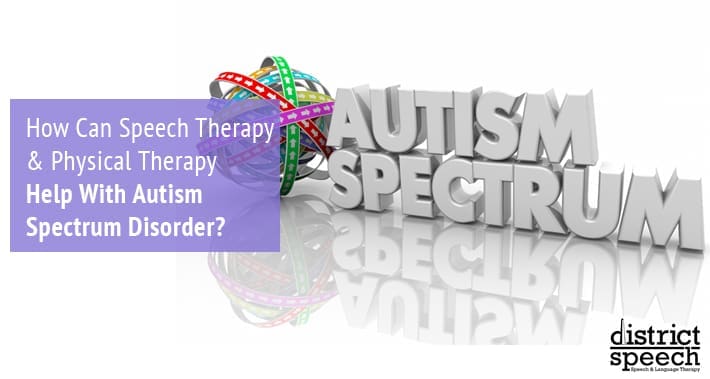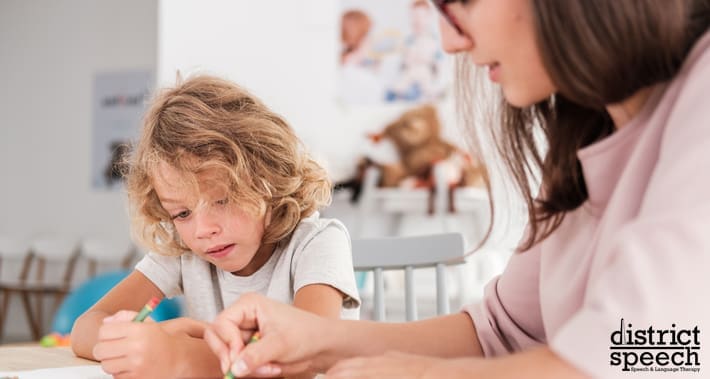
[ez-toc]
As a parent or caregiver, you’re likely sensitive to every little thing related to your child.
You are likely looking to make sure everything is going well in your child’s lives.
Some questions you may think about include:
- Is my child developing at a rate appropriate for their age, and reaching their physical developmental milestones?
- Is my child’s speech development happening at the “right” pace?
- How well does my child get along with other children?
If you start to notice issues regarding communication, behavior, or social skills it might be an indicator of autism spectrum disorder.
What is autism spectrum disorder?
It’s a developmental disorder, and a neurological disorder.
This means that autism spectrum disorder will impact your child’s development, cognition, and neurology (brain structure).
A diagnosis of autism can be a scary thing for parents, but it doesn’t have to be.
There are interventions you can take which will help ensure your child gets the skills they need to live a happy, fulfilling life.
If you notice any of the signs of autism spectrum disorder in your child, it is important you seek out a screening.
Screening can help detect symptoms early.
It is also important you seek treatment when symptoms arise for your child as soon as possible.
Early intervention is important in coming up with a treatment plan for your child.
Physical therapy for children with autism spectrum disorder can help them to develop the gross motor skills and fine motor skills they need to perform tasks themselves and grow to live independently.
In addition, speech therapy for children can help hone their communication and social skills.
If your child is autistic, we can help with pediatric physical therapy and speech therapy, so they can live happy and healthy.
Keep reading to find out more about what autism spectrum disorder is, and how physical therapy and speech therapy can help provide treatment for your child with autism.
What Is Autism Spectrum Disorder?
Autism is a developmental disorder which results in issues with behavior, social skills, speech, and communication.
Previously there were several terms used to describe disorders related to autism.
These terms were referred to as Asperger’s, childhood disintegrative disorder, pervasive developmental disorder (not otherwise specified), autistic disorder, and Rett syndrome.
In 2013, these terms were all merged under the umbrella of autism spectrum disorder.
Spectrum is a term used to refer to a disorder that varies in the type, and severity of symptoms that people experience.
As a result, each autistic person is different
Your child may be completely non verbal, or communicate like anyone else.
Autism spectrum disorder is also often comorbid with other disorders.
These include:
- ADHD
- Feeding and swallowing disorders
- Epilepsy
- >Issues with social anxiety
- Developmental disorders like Down syndrome
Some of the signs of autism include:
Behavioral Skills Challenges
Autistic people will often display issues with behavioral skills.
This is due to the fact autism impacts the areas of your brain involved in behavior.
These brain areas include the amygdala (which controls your emotions), and the frontal cortex (which controls behavioral impulses and inhibition).
This means the brains of autistic people differ in a number of ways from allistic people (people who are not autistic).
Some of these behavioral skills challenges you might see in autistic kids include:
- Displaying hyper focused interest in a small number of topics or objects
- Repetitive behaviors and gestures
- Pickiness when it comes to food textures
- Unpredictable emotions including laughing, crying, or anger for no apparent reason
- hypersensitivity to noises and smells
- Difficulty switching between activities
- Uses self-stimulation or>“stimming” through repetitive activities (such as spinning or rocking)
- Disliking, and being upset by, changes in routine
Social Skills Challenges
Autistic children often struggle with social skills as well.
This is because autism impacts the social areas in your brain.
Some social challenges your autistic child may face include:
- Trouble making and keeping friends
- Trouble sharing toys and playing with other children
- Difficulty with empathy
- Trouble knowing when to take their turn in a conversation
- Avoidance of eye contact
- Resistance to physical contact
Autistic children are also at an increased risk of having a speech or language disorder.
In particular, autistic children are more likely to be dyslexic.
RELATED: Speech Therapy For Learning And Reading Impairments
If this is the case, speech therapy can help.
Communication Challenges
Having difficulty with communication can make lots of everyday tasks extremely difficult for your child with autism.
These challenges may also be difficult for you as a parent or caregiver.
The severity of communication challenges will differ from person to person but some common symptoms include:
- Trouble with conversations
- Trouble understanding and using gestures
- May have trouble following directions
- Trouble learning to read and write or may read but may not understand what they are reading
- Trouble using words to communicate what they want
- Stuttering or repeating words and phrases
- Selective mutism
RELATED: Speech Therapy For Children Who Stutter
If your child struggles with following directions, there is hope.
There are activities that can be used to help with getting your child to follow directions in speech therapy.
Speech therapy can also help with the other symptoms of autism to improve their speech, reading, writing, and language abilities.
RELATED: How To Help Your Child Learn To Read
Other Issues
There are other signs of autism as well that don’t necessarily fit into the above category.
Like all autism signs, these might affect your child severely, or not at all.
These include:
- Lack of balance and coordination
- Experience delays learning to walk
- Trouble with fine motor skills, such as buttoning a shirt
- Limited hand eye coordination
- Has trouble mimicking other people’s movements, such as performing actions to go with a song
Regardless, Early Intervention Is Key
If you notice your child displaying signs, which could indicate autism spectrum disorder, seeking professional help early is important.
Early intervention in both speech therapy and pediatric physical therapy make it easier for your child to overcome the bad habits they can develop.
These habits can impact your child’s life in a negative way.
These habits can make it difficult to form friendships, and enjoy social interactions with others.
They can also make it difficult for your child in school, and work environments.
For example, the employment rate for autistic people is about 58% compared to about 95% of the general population.
This shows that if autistic children don’t get the support they need at an early age, they can become adults that struggle.
These habits can also become more difficult to overcome the older your child gets.
In addition, early autism screening and evaluation in Washington DC can help you better understand your child’s unique needs.
This can help your speech therapist or physical therapist development a treatment plan that is unique for your child.
This unique treatment plan can aid in early intervention, making it more likely that your child with autism will live a fulfilling life.
Let’s have a look at the roles of speech therapists, and physical therapists, in the treatment of autism spectrum disorder.

How Can A Speech Therapist For Autism Help?
One of the major areas in which a person with autism spectrum disorder may experience challenges is communication and appropriate social skills.
A speech therapist may help a person with autism work on the following skills:
- Developing appropriate communication skills
- Knowing when to speak, and let others speak in conversations
- Improving your child’s writing skills
- Improving your child’s reading skills
- Learning to accept change
- Changing from one task to another
- Getting along with others
- Exploring AAC options if necessary
Your speech therapist will help your child develop their articulation and language skills with toys and games.
This includes things like this fun kinetic sand game.
This play is important in helping your child develop their social and communications skills, literacy skills, thinking, and problem solving strategies.
How Can A Pediatric Physical Therapist For Autism Help?
Pediatric physical therapists can help autistic children with any issues related to motor delays and control.
One early predictor of autism spectrum disorder is delays in early movement skills.
These movement skills include both fine motor skills (tasks that use smaller movements of the hands) and gross motor skills.
(tasks that use the movement of larger muscles).
This can cause delays in walking, or the ability to crawl.
At this stage, a physical therapist will use play to help your child develop motor skills.
Play is not only beneficial for your child to develop motor skills but it can also help your child with bone density, and better cardiovascular health.
It also helps with keeping physically active.
Exercise will focus on developing coordination, and strength, learning how to walk, and how to climb stairs safely.
If your child is performing these tasks, you may want to make sure your house is safe for your child to learn how to walk.
But don’t forget to baby proof your house while your child is learning how to walk.
Book Your Appointment With District Speech Today
If you or your child is facing a diagnosis of autism spectrum disorder, know that you’re not alone.
By involving the right professionals early on, you can help ensure your child will develop the skills needed to live a full, rich life.
Physical therapy or speech therapy can both be beneficial for your child depending on their needs.
You may have a ton of questions related to your child’s autism diagnosis as well.
This is why we developed an FAQ about autism blog for you.
We’re District Speech, and we offer both physical therapy and speech language therapy in Washington DC and the surrounding area.
Book your appointment with District Speech today.
1300 I St NW, Suite 400 E,
Washington, DC 20005
- https://g.page/districtspeech
District Speech and Language Therapy specializes in speech therapy, physical therapy, and occupational therapy solutions, for both children and adults, in the Washington D.C and the Arlington Virginia areas.